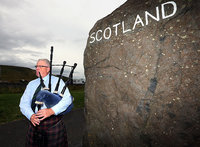Oh, no, Scotland said 'no'
Scotland, apparently, will not be independent. Exit polls show that Scotland said no. One has to admit that from the economic point of view, Scotland was not ready to secede from the UK.

Exit poll survey data provided by YouGov agency show that 54 percent of electors voted against independence, and 46 percent voted for independence from Great Britain. The voter turnout was high and made up 84 percent.
If the results of the vote confirm the above data, Scotland will remain a part of the UK. Even if the country became independent, it would retain strong ties with the UK, including economic and monetary ones. And here is where the problem lies.
The history of Scotland is very rich when it comes to money or the banking business. David Hume of Scotland was the first to describe the direct relationship between money, inflation and economic growth in 1748. The first joint-stock commercial bank was also a Scottish idea - it opened in the middle of the XIX century, having subsequently become, in fact, the basis of the global financial system.
Nevertheless, despite the rich past, the monetary future of independent Scotland was rather vague. The Scottish National Party (SNP) was planning to continue to use the British pound in any case, without creating its own currency.
The monetary union would largely be similar to the euro zone. The pound would continue to circulate in Scotland, and the Bank of England would propose to establish a single rate for both countries and support Scottish creditors during a possible crisis.
Such a union would eliminate the risks of changes in exchange rates and the cost of currency conversion. It would stimulate trade too. Due to the fact that trade in goods and services between Scotland and the UK amounted to 110 billion pounds ($178 billion) in 2013 - about two-thirds of Scottish GDP - the SNP believes that the sterling union would be the best option for both London and Edinburgh. Experts believe, though, that such an idea is just awful, The Economist said.
The sterling zone could face serious problems. Business cycles of its members are close, but not coordinated. This means that one and the same monetary policy could be too harsh for one side and too soft for the other side.
In Scotland, the SNP planned to increase spending by 3% a year, while the ruling Conservative Party in the UK intended to balance out the budget by 2019. However, the deficit in Scotland today is much larger than in Britain, and economic outlook is a lot worse due to the rapid aging of the population.
The lack of the unified fiscal policy could turn the sterling zone into a mini-eurozone, where Scotland would play the role of Greece. This is the reason why the supporters of the union with Great Britain strongly oppose this idea.
The pound would be used even if London rejected the creation of the monetary union. This is certainly possible. Today, there are eleven countries in the world that use the currency of another country on their territory. For example, Montenegro, Kosovo and Andorra use the euro, even though they are not included in the EU.
However, the use of the pound in Scotland without the consent of London would pose a number of serious problems. The Bank of England, without carrying a formal responsibility for Scotland, would conduct the monetary policy in the interests of the UK and would not respond to possible economic problems in the neighboring country.
A new currency and a new central bank could be, at first glance, a radical, but the best option for Edinburgh. This is a very popular move in the world: 28 new central banks have been created in the last quarter of a century, mainly in the former Soviet Union and Yugoslavia. Scotland could follow their example.
For example, Estonia, after gaining independence in August 1991, decided to create its own currency to replace the Soviet ruble. Less than a year later, in June 1992, all deposits in Estonian banks were converted from Russian rubles to crowns. The new central bank opened special points to exchange old money for new bank notes. To support the orientation to the crown, the government allowed citizens to exchange rubles even for a stronger currency - the German mark. In 2002, the IMF recognized Estonia's transition exemplary.
Meanwhile, the management of the new currency could be quite a difficult process. Poland and the Czech Republic quickly determined inflation targets and set a floating exchange rate. To reduce problems in trade, Edinburgh would have to set a fixed exchange rate, primarily to the British pound. In addition, the SNP would have to monitor costs strictly. Otherwise, Scotland would receive a huge deficit and the devaluation of the new currency.
Having counted 95 percent of ballots, in which the Scottish were asked to answer "yes" or no" to one question - "Should Scotland be an independent country?" - the electoral committee said that 44.6% said yes and 55.4% said no to independent Scotland.
The turnout for the referendum made up a record of 95 percent of registered voters.
Subscribe to Pravda.Ru Telegram channel, Facebook, RSS!


